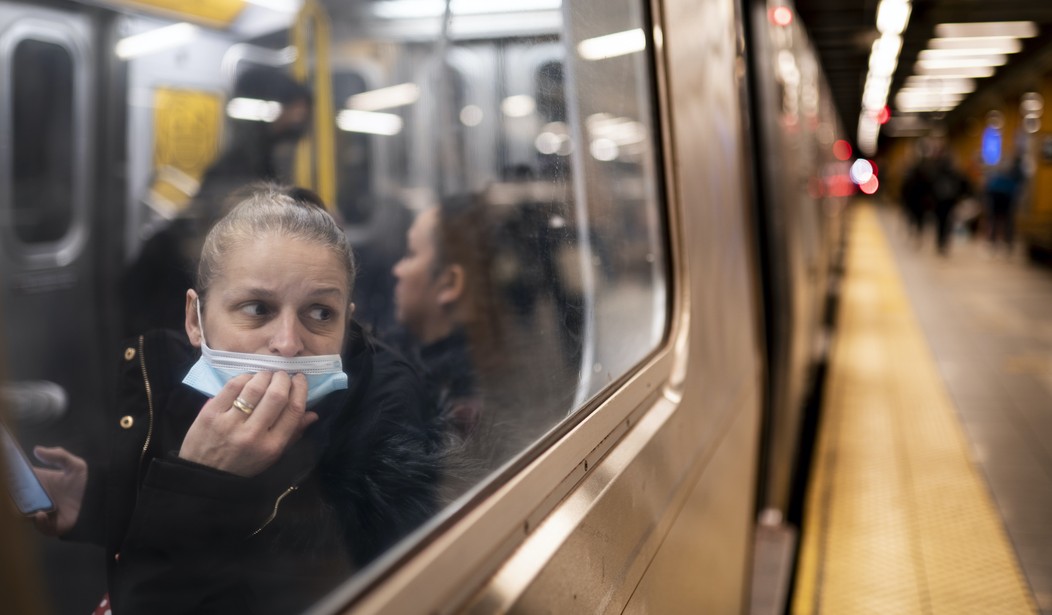The leader of a climate alarmism group pressuring people to take public transit as part of an effort to "lower greenhouse gas emissions in urban areas" was attacked at a New York City subway station last weekend.
Climate activist Layla Law-Gisiko, president of the progressive City Club of New York, which lobbied to penalize motorists driving in downtown Manhattan, was allegedly assaulted at a Manhattan subway stop around 3:30 p.m. on January 5. She says the attack left her battered, bruised, and "shaken" from the "distressing and painful experience."
Today at around 3:30 PM, I entered the subway station at 23rd Street and 5th Avenue. At the bottom of the first flight of stairs, an individual with a shopping cart began screaming at me and spat in my hair.
— Layla Law-Gisiko 罗蕾菈 (@laylaLawGisiko) January 5, 2025
On X, Law-Gisiko claimed it started when the assailant, "an individual with a shopping cart," screamed at her and spit in her hair on the bottom of the concourse's first flight of stairs. "The individual followed me into the mezzanine corridor, struck me with the cart, and caused me to hit the wall," she wrote. "He threatened to push me down the next flight of stairs."
While an assembly of passengers witnessed the altercation, Law-Gisiko then retreated toward the exit to call 9-1-1. Within approximately 25 minutes, four police officers arrived to take her statement. The cops soon found the suspect, asked Law-Gisiko to identify him, and arrested her alleged attacker.
Timothy Elliot, 45, was charged with harassment and assault in the incident, according to The New York Post. Elliot was later released on a desk appearance ticket, police told The Post.
"I am shaken, with a bruised ankle and a sore shoulder from being pushed into the wall," Law-Gisiko reflected. "This has been a distressing and painful experience."
Recommended
Law-Gisiko's group, The City Club of New York, has been championing a controversial congestion pricing plan, which forces New Yorkers to pay a fee—as much as $21.60, depending on vehicle type—for driving in high-traffic areas during peak hours.
The organization argues that "Fewer vehicles on the road means lower carbon emissions," putting the U.S. on pace to achieve net-zero greenhouse gas emissions by 2050 in accordance with the Paris Agreement, an international treaty aimed at "combating climate change by limiting global warming to well below 2 degrees Celsius." Moreover, "making driving more expensive" "incentivize[s] the use of public transportation," which is "typically less carbon-intensive."
Imposing this toll is "not just about managing traffic; it is a pivotal strategy in the broader fight against climate change," The City Club of New York says. "By aligning local actions with international commitments under the Paris Agreement, cities like New York can lead the way in creating a sustainable, resilient, and equitable future."
New York City's congestion pricing program went into effect on January 5, hours after Law-Gisiko was attacked.
The City Club of New York put out a press release announcing that they're "pleased" with the program's launch in Manhattan's Central Business District. Law-Gisiko co-signed the statement.
Now that congestion pricing is in place, The City Club of New York is demanding the Metropolitan Transportation Authority (MTA) to "Deliver Real Equity and Environmental Justice" by allocating revenue generated from such fare hikes toward "historically underserved regions."
Critics call the program, which will fund the MTA's $15 million capital plan, a cash grab. The money would reportedly finance a $3 billion Second Avenue subway extension, $2 billion in station renovations across all boroughs, and a $1 billion investment in new electric buses, among a medley of MTA projects.
To date, the congestion policy charges drivers of passenger cars a $9 fee per day and those driving larger vehicles, such as small trucks, up to $14.40. The toll also affects taxis and ride-sharing services like Lyft and Uber.
Last year, The City Club of New York successfully sued Gov. Kathy Hochul to compel its implementation after the governor's office temporarily paused the program's rollout over concerns that the toll places an unfair financial burden on many working-class commuters. "This case is about democracy and executive overreach," the lawsuit says.
Opponents of the program, including a top transit labor leader, have complained that the city's subway system is too dangerous for New Yorkers to be forced underground due to the toll mandate.
In response to pushback, MTA boss Janno Lieber claimed that the threat of subway crime is "in people's heads" and not a real concern. "Some of these high-profile incidents, you know, terrible attacks have gotten in people's heads and made the whole system feel unsafe," Lieber told Bloomberg Surveillance. "The overall stats are positive."
Transport Workers Union president John Samuelsen tweeted that if Lieber was "routinely assaulted like hundreds of @transportworker members have been under his tenure, or shoved in front of an oncoming train, or lit on fire by a crazed lunatic, he'd be far less snarky and indifferent to the tribulations of working New Yorkers."
There have been an increasing number of attacks on New York City's subway system—nicknamed the "Murder Express." According to The New York Post's analysis of NYPD data, murders on the rails soared to 60 percent in 2024, as of September.
Per The Post, New York hit 2022's 25-year high of transit-related killings when an illegal alien, identified as previously deported Guatemalan national Sebastian Zapeta-Calil, allegedly set a sleeping homeless woman on fire aboard a Brooklyn train. Cameras captured 57-year-old Debrina Kawam being burned to death as the accused killer was filmed fanning the flames. The city's medical examiner struggled to identify the body because Kawam was so severely scorched.

























Join the conversation as a VIP Member